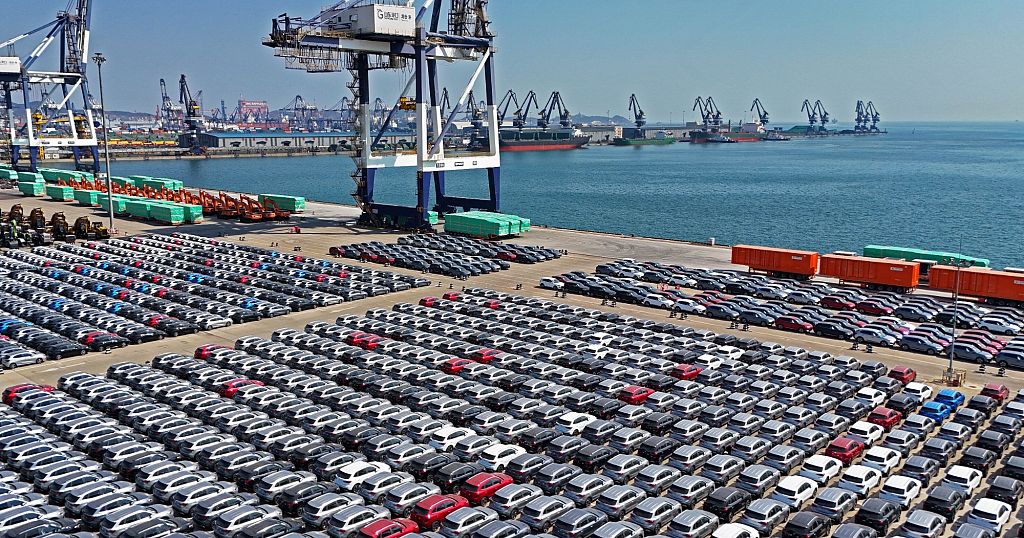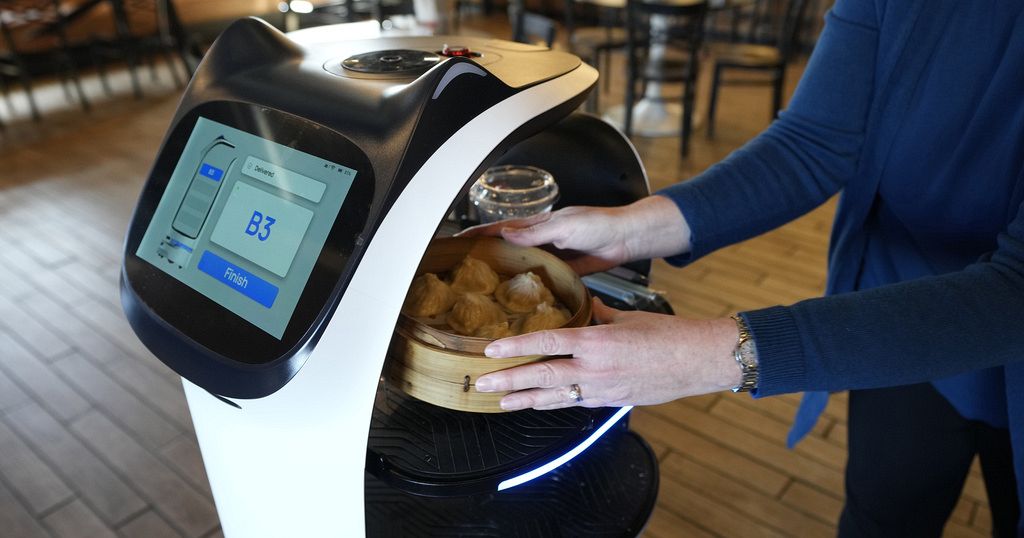Africa
China vows to ‘Fight to the End’ as trade war with U.S. escalates

China again vowed to “fight to the end” Wednesday in an escalating trade war with the U.S. as it announced it would raise tariffs on American goods to 84% from Thursday. Beijing also added an array of countermeasures after U.S. President Donald Trump raised the total tariff on imports from China to 104%. “If the U.S. insists on further escalating its economic and trade restrictions, China has the firm will and abundant means to take necessary countermeasures and fight to the end,” the Ministry of Commerce wrote in a statement introducing its white paper on trade with the U.S. The government declined to say whether it would negotiate with the White House, as many other countries have started doing.
On Friday, China announced a 34% tariff on all goods imported from the U.S, export controls on rare earths minerals, and a slew of other measures in response to Trump’s “Liberation Day” tariffs. Trump then added an additional 50% tariff on goods from China, saying negotiations with them were terminated. So far, China has not appeared interested in bargaining. “If the U.S. truly wants to resolve issues through dialogue and negotiation, it should adopt an attitude of equality, respect and mutual benefit,” said Ministry of Foreign Affairs spokesman Lin Jian Wednesday.
The paper says that the U.S. has not honored the promises it made in the phase 1 trade deal concluded during Trump’s first term. As an example, it said that a U.S. law that would ban TikTok unless it is sold by its Chinese parent company violates a promise that neither would “pressure the other party to transfer technology to its own individuals.” Trump signed an order to keep TikTok running for another 75 days last week after a potential deal to sell the app to American owners was put on ice. ByteDance representatives called the White House to indicate that China would no longer approve the deal until there could be negotiations about trade and tariffs.
The paper also argued that taking into account trade in services and U.S. companies’ domestic Chinese branches, economic exchange between the two countries is “roughly in balance.” It says that China had a trade in services deficit with the U.S. of $26.57 billion in 2023, which is composed of industries like insurance, banking and accounting. Trump’s tariffs were designed to close trade deficits with foreign countries, but those were calculated only based on trades in physical, tangible goods. “History and facts have proven that the United States’ increase in tariffs will not solve its own problems,” said the statement from the Chinese commerce ministry. “Instead, it will trigger sharp fluctuations in financial markets, push up U.S. inflation pressure, weaken the U.S. industrial base and increase the risk of a U.S. economic recession, which will ultimately only backfire on itself.
Africa
Funeral held in Kenya for TikTok content moderator

The funeral was held on Thursday for a Kenya-based Nigerian content moderator who died in unclear circumstances last month.
Ladi Anzaki Olubunmi’s decomposed remains were found on March 7 at her apartment on the outskirts of the Kenyan capital, Nairobi, three days after she failed to show up at work.
Among the mourners was her elder brother, who travelled to Nairobi for the emotional ceremony. He was overcome by grief as friends and colleagues eulogised Olubunmi as “selfless.”
Olubunmi, 43, who was employed as a TikTok content moderator subcontracted by a global outsourcing firm, Teleperformance, had complained of fatigue before her death, the cause of which has not been revealed.
She had been living in Kenya since 2022 and only managed to travel back home once, despite having an annual return ticket benefit in her employment contract.
Colleagues said she was “desperate to go home” but was denied leave. Teleperformance Kenya said in a statement in March that she wasn’t denied leave to travel home. In a tribute, a company spokesperson described Olubunmi as “a selfless, compassionate and deeply caring individual.”
Content moderators working for subcontracted firms based in Kenya have in the past described working conditions that they say include lower than average pay, lack of mental health support, long working hours and intimidation.
More than 100 former Facebook content moderators have sued the social media company for poor pay and working conditions and unfair termination of employment.
Tauheed Tayo Yakubu, a colleague of Olubunmi, described her as a champion for better working conditions, detailing how in November 2023, she staged a walkout for Nigerian colleagues demanding for valid work permits.
“She requested that every Nigerian leave the job immediately and then we all marched,” he said.
Africa
European Union announces new asylum measures

Migrants from Bangladesh, Colombia, Morocco and Tunisia are unlikely to be granted asylum in Europe and should have their applications fast-tracked so they can be sent home more quickly, the European Union’s executive branch said on Wednesday.
The European Commission said that seven countries – also including Egypt, India and Kosovo – should be designated “safe third countries.” Applications by their citizens for international protection would be wrapped up in 3 months rather than the usual 6.
“We streamline and we speed up the processing of asylum applications, but we do not cut back on fundamental and human rights,” said European Commission spokesperson Markus Lammert.
“What it does is it allows for faster procedures for those whose asylum applications are likely to be unfounded,” he added.
In total, more than 200,000 people from these countries applied for asylum last year.
A year ago, E.U. nations endorsed sweeping reforms to the bloc’s failed asylum system. The rules were meant to resolve the issues that have divided the 27 countries since well over 1 million migrants swept into Europe in 2015, most fleeing war in Syria and Iraq.
But the new rules are not set to enter force until at least June 2026, and the commission is desperate to speed up procedures, including by deporting people more quickly, to ease pressure on migrant reception facilities.
“This E.U. list brings harmonization across member states,” said Lammert. “And this will ultimately help reduce secondary movements and also asylum shopping.”
The plan must be endorsed by E.U. member countries and the European Parliament before it can enter force.
Under it, asylum applications by people coming from countries that are candidates to join the E.U. – Albania, Bosnia, Georgia, Moldova, Montenegro, North Macedonia, Serbia and Turkey – would also be fast-tracked.
On top of that, E.U. members could speed up proceedings for people coming from countries where 20% or less of applicants are granted international protection in Europe. The so-called recognition rate for the seven “safe third countries” is 5% or less.
Africa
Robot waiter becomes a star attraction at Havana restaurant

In a city known more for its classic cars than cutting-edge tech, a restaurant in Havana is turning heads and going viral, thanks to a high-tech new team member: a robot waiter.
Doña Alicia, a restaurant located in the heart of the Cuban capital, has captured public attention with its futuristic service. Despite frequent power outages and limited access to advanced technology, the eatery made a bold move to modernize, gradually integrating digital tools into its customer experience.
The innovation began with tablets on tables and voice assistance via Amazon’s Alexa. Now, a robot glides through the restaurant, delivering meals, shaking hands, and even saying goodbye to guests.
Customer Sonia Pérez was awestruck.
“The robot is going to come here and bring me the food I ordered! I saw a robot and I said this is like the movies,” she said. “It brings me food, says thank you, I reply you’re welcome, it shakes hands with me, says goodbye, and I say goodbye to it.”
The novelty has helped the restaurant attract curious locals and international visitors alike.
“Sometimes I’m really tired,” said Mariko Ohata, a tourist from Japan. “I cannot communicate in Spanish with another Cuban, so if I want something, it’s just a touch! I can take everything.”
Doña Alicia’s manager, Yadiel Hernández, said the move was both daring and strategic.
“It was an interesting idea to bring a robot to Cuba. It has allowed us to get to other types of customers and surprise them because it’s something new.”
While robot waitstaff are increasingly common in countries like Japan and South Korea, they’re a rarity in Cuba, where tech innovations often face infrastructure hurdles. Still, the gamble is paying off, with the robot attracting a steady stream of customers and social media buzz.
Cuba has made significant strides in digital connectivity in recent years. While the internet only became widely available on mobile phones in 2018, today, over 70% of the population is online—a shift that’s paving the way for more ambitious tech experiments like this one.
-

 Education2 days ago
Education2 days agoTrump administration revokes humanitarian parole of Spanish teacher
-

 Conflict Zones2 days ago
Conflict Zones2 days agoAfter two years of war in Sudan, the world can no longer plead ignorance | Conflict
-

 Europe2 days ago
Europe2 days agoMultiple French prisons attacked in response to government’s narco crackdown, ministers say
-

 Conflict Zones12 hours ago
Conflict Zones12 hours agoHaiti in ‘free fall’ as violence escalates, rights group warns | Armed Groups News
-

 Europe2 days ago
Europe2 days agoCody Balmer, the suspect in arson at Pennsylvania governor’s home targeted the governor for his views on war in Gaza, warrant says
-

 Sports2 days ago
Sports2 days agoNew Orleans Saints win lawsuit over fleur-de-lis trademark filed by ‘direct descendant of the Kings of France’
-

 Sports2 days ago
Sports2 days agoStephen Curry and Jimmy Butler lift the Warriors past the Grizzlies and into the NBA Playoffs
-

 Europe2 days ago
Europe2 days agoPolice arrest couple for breeding and selling exotic cats in Spain




